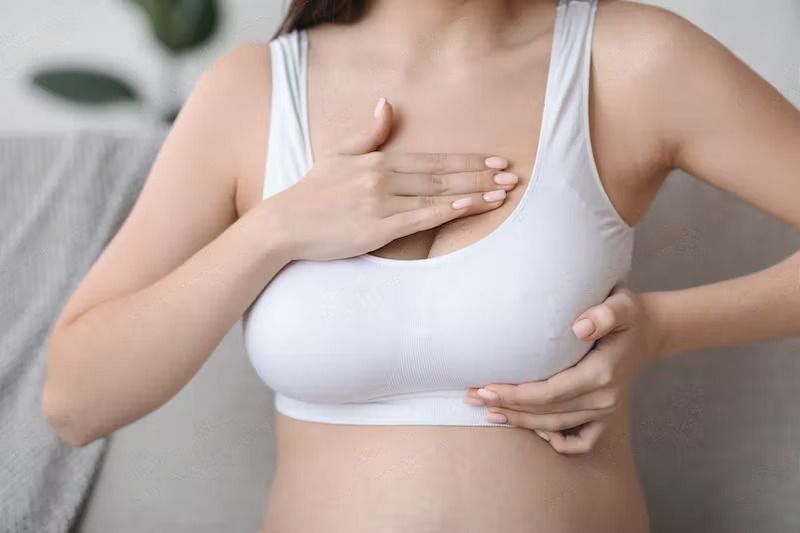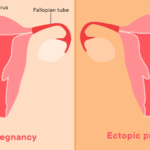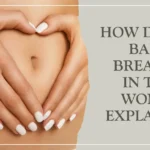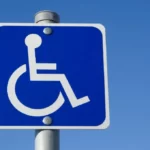
You may be preoccupied with your expanding tummy and how your developing child’s growth relates to various fruits and veggies during pregnancy (“He’s the size of a kiwi now!”). Pregnancy boobs are another significant body change you’re dealing with and maybe wondering about how will my breasts change during pregnancy?
Related: 15 Questions to Ask at First Prenatal Visit
Normal Breasts Change During Pregnancy?
It would be an understatement to suggest that your breasts might change, from feeling like they’re going to explode out of your old bras to observing your areolae take up more space on your breasts. What is causing all of these extreme breast changes, then? When you are expecting, you can anticipate the following from your breasts:
Your Breasts are Likely to Grow Tenderer
One of the first early indicators of pregnancy is swollen, painful breasts, which appear long before you even pee on a stick. You can attribute it to hormones, as you can with almost all pregnancy changes. Breast pain is related to the increase in hormones and blood flow to the breast tissue. Your progesterone and estrogen levels surge specifically during pregnancy. They can cause pain throughout pregnancy, just like they can during your period, which can result in sore boobs.
Additionally, breast pain during pregnancy occurs because there is so much more breast tissue, which means it is under more strain. The amount of fat increases, and the glands that produce milk enlarge. To fit everything else, the tiny veins in the breast are likewise growing more numerous. It’s becoming overcrowded.
The good news is that the pains frequently subside quickly. This discomfort normally disappears during the first trimester.
Related: What Are Common Discomforts During Pregnancy?
Veins May Become More Visible

Blood volume rises by about 50% throughout pregnancy. Veins are more obvious on lighter skin tones, making that lacy bluish pattern stand out more.
They May or May Not Go Up a Cup Size
As your hormone levels rise throughout pregnancy, the glands in your breasts begin to expand in preparation for milk production. In addition to increasing your weight to support your developing pregnancy, you are also gaining blood volume. Although all these things may contribute to larger breasts, not every person’s breasts will react in the same manner.
It is challenging to normalize breast growth because each woman experiences it differently. Some women don’t even detect a significant difference in their breast size during pregnancy. The average cup size increase in patients’ breasts during pregnancy is one. Stretch marks can result from this, which are completely natural and occur as the skin expands, especially quickly.
Your Nipples Can Become More Sensitive, Which Could Make it Simpler to Turn on Or it Might Go the Other Way
Hormonal changes and breast growth can give your breasts a whole new range of feelings. Some women experience higher nipple sensitivity as a result of this, which may result in more sexual excitement. In fact, for some people, their nipples turn into off-limits areas. The nipple can occasionally be extremely sensitive.
Your Areolae (and Nipples) Will Likely Enlarge and Darken
Your areolae and nipples may develop throughout the course of pregnancy due to rising levels of estrogen and progesterone.
You’re not dreaming if you notice that while you’re pregnant, your areolae and nipples look darker than they did before. This is especially prevalent if you already have a dark complexion.
The most likely explanation for the darker [areolae and] nipples is a transient increase in melanin brought on by the rise in pregnancy hormones.
Though the scientific jury is still out, it’s possible that the melanin alteration in the areola and nipples has some sort of function.
You Might Start Noticing Little Pimples on Your Areolae if You Hadn’t Before
These tiny bumps are Montgomery glands, which are tiny glands. They were always present, but when a person is pregnant, they become more obvious and apparent. If you’ve just recently become aware that you have them during pregnancy, know that they were always there. Similar to an integrated body lotion, these glands secrete oil to keep the areolae and nipples moisturized.
Your Breasts Can Begin to Leak Milk
And you believed that only breastfeeding women experienced that. Even while you are still carrying the baby, it is still possible. Surprise! Late in pregnancy, women begin to produce colostrum, which is sometimes referred to as “liquid gold” due to its abundance of antibodies, protein, and carbs. Occasionally, a pregnant woman may experience a clear, yellow nipple discharge that could represent colostrum.
Some women have milk production prior to giving birth. Simply put, it’s because those glands are prepped and ready. You shouldn’t panic if you notice it.
Related: Can You Rely on a Negative Pregnancy Test?
Abnormal Breasts Change During Pregnancy?
While all of these breasts change during pregnancy are natural, there are a few that you should be aware of since they demand a trip to the doctor.
You should inform your doctor if you notice any bloody nipple discharge. It might be an indication of mammary duct ectasia, which occurs when milk ducts enlarge, their walls thicken, and the ducts become plugged. However, infrequently, bloody nipple discharge might be a symptom of intraductal carcinoma (also known as ductal carcinoma in situ). This occurs when abnormal cells are found in the breast ducts and is sometimes referred to as the first stage of breast cancer.
If you see any strange lumps or skin changes, such as discoloration or swollen breasts with an orange peel-like texture (known as peau d’orange—an indication of inflammatory breast cancer), you should also seek medical advice. Regardless of whether you are pregnant or not, it is always a good idea to discuss any physical changes you are experiencing with a medical expert.
Related: How to Get Birth Control Online? (Detailed Review 2023)
Conclusion
So, while we addressed numerous common breasts change during pregnancy above, each person’s experience may differ. These breast changes during pregnancy are natural and are preparing your body for nursing your baby. Adapting to these changes is critical for a successful pregnancy. You can always visit your doctor if you have any concerns or queries.
Related: 7 Ways Your Breasts Change During Pregnancy
Frequently Asked Questions
Will my Breasts return to their Pre-Pregnancy Size after Childbirth?
While breast size varies for each woman, it’s common for breasts to decrease in size after breastfeeding. However, they may not return to the exact same size and shape as before pregnancy.
Can Breasts Change during Pregnancy affect Breastfeeding?
No, the breast changes that occur during pregnancy are a natural part of the preparation for breastfeeding. These changes help ensure an adequate milk supply and proper nourishment for your baby.
Should I be Concerned if I Experience Intense Breast Pain during Pregnancy?
While breast tenderness is a common symptom during pregnancy, intense or severe breast pain should be discussed with your healthcare provider. They can evaluate the cause and provide appropriate guidance and support.
Can I Prevent Breasts Change during Pregnancy?
Breast changes during pregnancy are largely influenced by hormonal shifts and the natural preparation for breastfeeding. While you cannot prevent these changes, wearing a well-fitted, supportive bra and practicing good breast hygiene can help ease discomfort.
Is it Normal to have one Breast Larger than the other during Pregnancy?
Yes, it’s common for women to have one breast slightly larger than the other even before pregnancy. During pregnancy, hormonal changes and increased blood flow can accentuate this difference. However, if you notice a sudden and significant change in breast size, consult your healthcare provider.
Can I still Breastfeed if I have Inverted Nipples?
Yes, women with inverted nipples can still breastfeed. In most cases, the baby’s latch and suckling action can help draw out the nipples. However, if you have concerns, it’s advisable to consult a lactation specialist for guidance and support.
How Long do Breast Changes Persist after Pregnancy?
Breast changes can vary from woman to woman. Some changes, such as increased size and darkened areolas, may persist during breastfeeding and gradually subside afterward. However, it’s important to note that breasts may not return to their exact pre-pregnancy state.
What can I do to Manage Breast Discomfort during Pregnancy?
To manage breast discomfort, consider wearing a supportive bra with wide straps, avoiding underwire bras, and using warm or cold compresses for relief. Additionally, maintaining a healthy lifestyle with regular exercise and a balanced diet can contribute to overall breast health.












